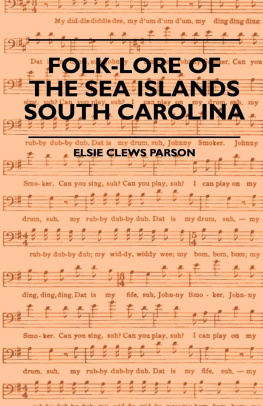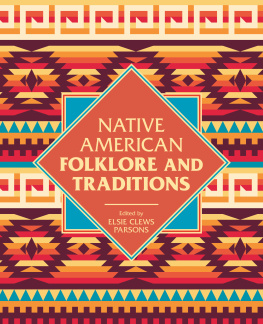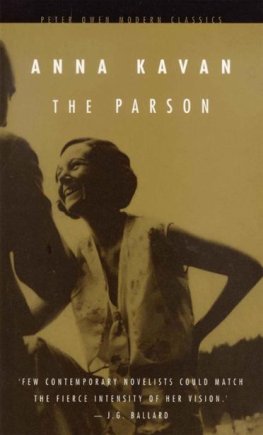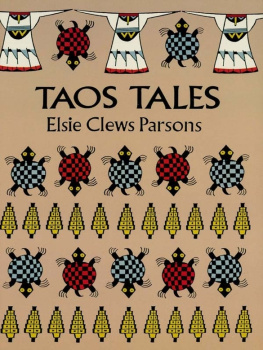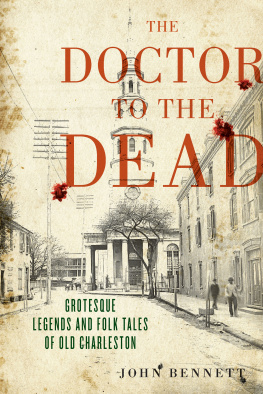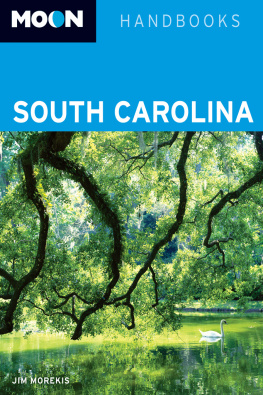CONTENTS.
PREFACE.
THESE tales, riddles, unsophisticated beliefs, and odds and ends of Sea-Island folk-lore, were collected in February, 1919. Just off a train from the North, as I stood on a street-corner in Beaufort, keeping an eye on the little dock where the sail-boat put in for passengers to Ladies Island or to St. Helena, I noticed a ditch-digger make ready to quit his job for the day; and I heard him call back to a mate, Mos kill bud don make soup! Later that moonlit evening on Ladies Island I swopped riddles with the woman who had been induced to hitch up a neighbors horse to her own buggy and drive me across the Island and inland on St. Helena, to Penn School. On the way she pointed out the oyshterfactory she had worked in as a child. She had never been to school. From this Ladies-Islander I first heard what is perhaps the most current of all the Island riddles: Horse in the stable, mange outside,a riddle identical, except to answer, with a riddle recorded in Sierra Leone, and with a Portuguese Negro riddle I collected two years ago in New England. From my driver also I heard two riddles I never heard again, Riddles 44 and 45,riddles again quite in the Cape Verde Islands style.
Every Sea-Islander, I was to find, knew, and was seldom too shy to tell, a few riddles. As for the tales, which they also call riddles, or now and then fables or little jokes, although they too are quite generally known, the telling is more a matter of circumstance. School-children, when talked to on the steps of the school-house or around the corner (in the class-room one may better get up a bout of riddles), will tell all the stories they know, and may reveal unsophisticated notions and attitudes; and, as many of the tales in the following collection evidence, the school-children are clever story-writers. Even when the written stories have lost the vivacity of narration, they may be interesting as showing the effect of the more or less foreign culture of the school upon language and point of view. Compare, for example, Ber Wolf done de same trick with The wolf did as he was told. Is there not a significant cultural gap between the two sentences? I venture to say that analysis of the written and oral variants of several of the following tales will reward the student of the processes of acculturation.
From this point of view I have included, contrary to the way of editors, a large number of variants. If folk-tales have indeed the cultural significance imputed to them, their growth and decay are of moment, and such processes can best be studied by an accumulation of variants. Indeed, the time may come when the collector will feel called upon to publish as well as record all the variants he hears.
The study of variants has a bearing not only on acculturation, but on the development of the folk-tale per se; successful variants being, no doubt, at times the source of new tales. In this connection, Variant III of Tale 20 is of interest; and so are Variant I of Tale 22, and Tale 30, which may be taken as a variant of Tale 29. Similarly in Tale 40 is an incident which might quite well develop into a fresh tale.
As one might expect, adults are often less nave than children about story-telling. Southern Negroes feel that their stories belong to the part of life, that major part, which they do not share with their white neighbors. James Murray, in whose cabin on Hilton Head I had been enjoying a very good and fruitful time, told me that, had I staid on in the house of the white man where I first suggested story-telling, he would have told me no tales, fo no money, not fo a week. And he added on the subject of racial relations: We pay dem fo what we git, an dey pay us. We don boder wid dem, an dey don boder wid us. We wouldn tell riddle befo dem, not even if we was a servan in deir house. Nevertheless a white who does bother a bit, and who pays besides, can hear tale upon tale. Cep fo de rain, remarked Mr. Murray, as he drove Mr. Jack and me to Spanishville to row out to the river-steamer to Defuskie, cep fo de rain, de people would be flockin in to my house to tell you riddle.
The Sea Islands stretch out along the coast of South Carolina from Savannah to north of Charleston. On a small island like Dataw live a dozen or so families; there may be twenty-five or thirty families on Coosa; the large and comparatively thickly peopled islands of St. Helena and Edisto have populations of three or four or six thousand. Beaufort, the metropolis of the Islands, has a population under three thousand,colored, 1557; white, 1262. On none of the other islands are there as many as one hundred whites. I visited Port Royal, on which is built the charming town of Beaufort, Ladies Island, St. Helena, Hilton Head, and Defuskie; and tales and riddles were contributed by natives from Edisto, Dataw, Warsaw, and Paris. Tales were contributed also by natives from the mainland of South Carolina and of Georgia, particularly from Savannah. Savannah, I was told more than once, is a place to hear tales; and several of the tales told me were first heard by their narrators in Savannah or on boats bound for or from Savannah. You could get story on the Savannah boatdats whey dey tell um. In an oyster-boat sailing to Savannah from Defuskie between midnight and dawn I did, in fact, listen to tales,the tales of Henry Ryan as he stood at the wheel of the sloop he had been sailing for the past eight years for the oyster-factory of Defuskie; and the tales of Jack Brown, now, despite the loss of an arm skylarkin, boat-builder at Beaufort, and some time sailor on the coas.
It was at that time that Jack Brown must have learned from sailors from the Iberian peninsula or islands Tale 74, the compound tale of The Deserted Children, Escape up the Tree, Rescue of the Kings Daughter. Rescue of the Kings Daughter is a variant of one of the most widespread of Iberian tales. I was next to hear it in New Mexico from a Keres Indian who had learned it from Mexican shepherds. Of the recorded variants of Escape up the Tree,that stock which was long ago, in its pre-American period, enriched by Hispanic tales brought to the African West Coast. The Cape Verde Islander on Cape Cod, Jack Brown in Carolina, were but repeating an old process,the transmission of Asiatic or European tales to the Americas by way of Africa. Unsurpassed as hardy voyagers and explorers, the men of the Iberian Peninsula, together with their descendants, black and white, are also unsurpassed as carriers of folk-tales.
But not alone with foreign sailor-folk have the Sea-Islanders had traffic in tales. Nowadays, and perhaps for some time past, the Islanders visit the North or go to live in the North, returning on visits to the Islands. Of Maria Middletons four sons, one was living in Savannah, another in Charleston, while the third was in Philadelphia, and the fourth I found back from Boston on a visit. Of two cousins of the Murrays of Hilton Head, one spent the winter on his near-by farm and went North in summer to make big money, and the other was back from New York for the burial of her father. She had been two years in New York employed as a candy-girl at Huylers, Fifth Avenue. New York is referred to in Tale No. 92 as is Arkansas in Tales Nos. 97 and 91 (Hackumsaw); and in all these tales, likewise in Tales 82, 83, 84, 153, the anecdotal type is reminiscent of the Northern minstrel-show. The colloquy introduction proper to this kind of narrationaccording to James Murray, Whey you been?I been to.What you see? etc.smacks, too, of the minstrel-show. It would be interesting to learn from what sources the minstrels themselves derived their set forms of colloquy and their characteristic formulas of humor. Whether a source or a derivation, whatever its provenience, the tale or anecdote of humorous exaggeration is part and parcel of current Carolinian folk-lore. So are the kindred noodle-tales of Ahshman, and the curiously Boccacio-like tales about the Reverend, as preacher or minister is customarily called.


